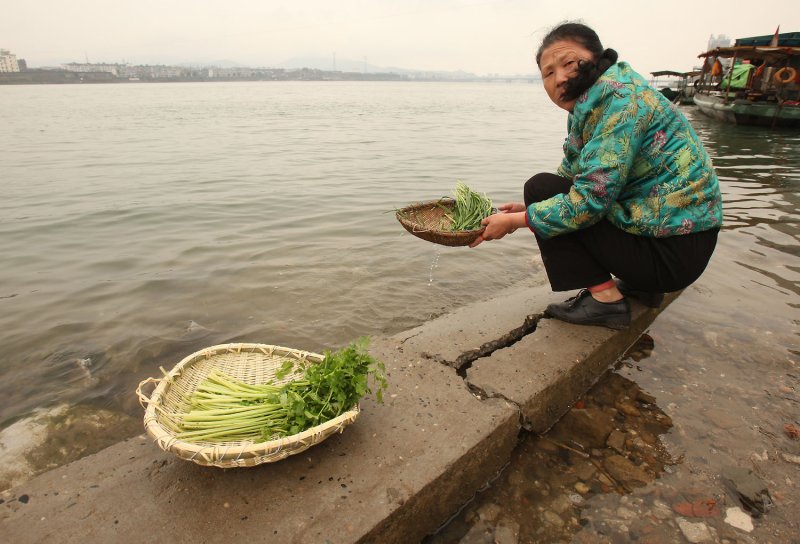1 of 6 | A Chinese woman washes vegetables in the Hanjiang River, the largest tributary of the Yangtze River, just a 100 kilometers south of the massive Danjiankou Dam in Xiangfan, Hubei Province, China March 22, 2011. A costly project to enable the dam to control "100-year floods" is near completion, according to government officials. When it was completed in 1973, the dam held back the largest reservoir in Asia. Now the reservoir will be two-thirds larger. UPI/Stephen Shaver |
License Photo
BEIJING, April 25 (UPI) -- Climate change is threatening China's water supply, a government official said.
"China faces an imbalance between the supply and demand of water to support its rapid social and economic development, while protecting the natural environment and ecosystems," Minister of Water Resources Chen Lei told a roundtable meeting on climate change in China, the country's English newspaper, China Daily, reports.
Global climate change could further exacerbate existing problems over water security, water supply and farming irrigation, Chen said.
While China has the world's largest population, figures from China's Ministry of Water Resources indicate the country's per capita water resources are only 28 percent of the global average.
Chen said China has a water shortage of 40 billion cubic meters a year, with two-thirds of cities experiencing increased scarcity of water.
Sustainable water management -- aimed at helping the country's limited water supplies to meet the demands of economic development, along with preserving existing ecosystems – could help China to face uncontrollable climate change and the resulting droughts, floods and water shortages, Chen said.
The Chinese government, the minister said, "is stepping up the efforts in water resources management by enhancing the water supply capacity for urban and rural areas, flood prevention systems and the construction of farming infrastructure."
The Chinese government is expected to invest $612 billion in water conservancy projects over the next 10 years.
"China is vulnerable to the impacts of uncontrollable climate change as its water infrastructure is weak or unprepared for such changes," said Khalid Mohtadullah, a senior adviser of the Global Water Partnership.
"Policymakers need better information about the regional impact of climate change on water supplies and on ways of adapting to it, otherwise it will have a negative effect on China's economy and could lead to a reduction in economic growth," said Mohtadullah.
The latest research by the Chinese Academy of Engineering and the Ministry of Environmental Protection indicates that 320 million rural people in China don't have access to safe drinking water, with 190 million using drinking water that contains excessive levels of hazardous substances.
Chinese state-owned news agency reported Monday that more than 2,600 families in Yichun County of northeast China's Heilongjiang province are showing physical symptoms from drinking polluted water.
Officials said the outbreak was likely triggered by a seepage well containing underground water supply pipelines, with the amount of colon bacillus exceeding safety standards.















